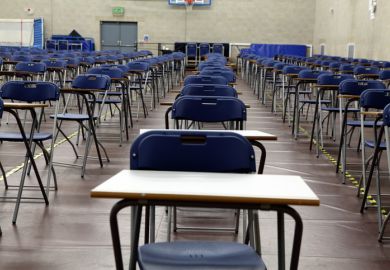It’s weird. I’m driving somewhere I’ve driven a million times before, yet I put on the GPS. Something about seeing the route all laid out, the turn coming up, the time of arrival; it’s all so reassuring. I find myself daydreaming as I just follow the directions, safe in the knowledge that they will get me where I need to go.
This is formally called cognitive offloading, and I think it might be the most powerful aspect of using AI to help college students succeed.
I made ChatGPT my formal teaching assistant last semester, and it went really well. The AI offered personalised, on-demand tutoring that scaffolded students’ learning. It took a huge amount of work to get it right, but it was well worth it. I’d like to believe I’m a good teacher: I get high student evaluations and have won multiple teaching awards. Yet I’ve never been more excited about my teaching than I am now.
The haters complain that ChatGPT’s output is banal, or that students shouldn’t write like that, or that (egad!) ChatGPT is “superficial and dubious”. But let’s get real. Long-term data trends show that only 20-30 per cent of graduating high school seniors in the US get to “proficient” in their writing. Substantial numbers of students therefore come to college woefully underprepared. In addition, they don’t actually learn much while they are here and spend minimal time on their studies. My point is that my students don’t really know how to become good writers. They need a road map.
I’m not, by the way, saying anything new or shocking here. Long before ChatGPT was a glimmer in Sam Altman’s eye, researchers noted that novice writers did not know how to plan their writing or articulate a main point. As one study found, they lacked “heuristics for reflection” and “executive strategies for making use of what they already know in order to extend current knowledge”.
This is where ChatGPT comes in. I taught my students how to use it to brainstorm an idea, develop a set of keywords to support further research, create a strong thesis statement and then organise all of this into a clear and coherent outline for their first draft. Then, emphasising that writing is an iterative, multi-stage process, I showed them how ChatGPT could provide feedback so they could write a better second draft. (And for those of you who are wondering: yes, this is exactly the writing cycle good writers use; and, yes, ChatGPT can provide formative feedback comparable to that provided by humans.)
All of this took a huge amount of trial-and-error “prompt engineering” on my part, but by the end of the semester, 77 per cent of my students said (in an anonymous survey) that using ChatGPT was extremely helpful for their learning. As one student wrote: “I am a big fan…[ChatGPT] is extremely helpful for brainstorming and getting a basic, easy understanding of a topic to create a baseline of knowledge before looking at more scholarly research articles. It also provided me with an outline and, though I may or may not take advantage of it, it’s definitely helpful to see one way that the topic could be mapped out.”
This, dear reader – if I may gloat just a little bit – is the perfect embodiment of a scaffolding aid to help develop students’ executive strategies. As another student said: “When I am confused about something, or need some feedback, ChatGPT is really good…as long as you ask it the right things and know how to word what you need help with.”
That recognition – of the importance of prompting – brings me to two pivotal realisations I plan to build on this semester.
First, I saw again and again that students who had minimal engagement with ChatGPT got minimal results: a classic example of “garbage in, garbage out”. Students who did not know how to prompt (and re-prompt) the system found it unwieldy, while those who took the time to experiment with it gained more from it and did better.
It also aligns perfectly with the theory of a “cognitive apprenticeship”, whereby “chunking, sequencing, detailing, reviewing, or any other means to structure the task and its components [help to] fit it into the learner’s zone of proximal development”. The power of ChatGPT is exactly that, with the right prompting, it will immediately adapt to a student’s level, allowing them to comprehend something enough to keep learning.
Second, last semester made me truly see the power of viewing ChatGPT as a tool. “I tend to encounter challenges starting my papers,” one of my students wrote. But “the template that ChatGPT provided assisted me in structuring my ideas effectively, allowing me to start my paper with a solid foundation”.
My students have powerful ideas and perspectives and points to make, but they have never been able to clearly name and articulate them. They didn’t have road maps. ChatGPT has become their GPS to help guide them to their destinations.
It’s weird. I’m teaching something I’ve taught a million times before, and now, for the first time, I have a co-pilot. I’m not sure that using ChatGPT will let me daydream in class, but it does allow me to focus more on my students’ learning, safe in the knowledge that, between us, we'll get them to where they need to go.
Dan Sarofian-Butin is a professor in the department of education and community studies at Merrimack College, Massachusetts.
Register to continue
Why register?
- Registration is free and only takes a moment
- Once registered, you can read 3 articles a month
- Sign up for our newsletter
Subscribe
Or subscribe for unlimited access to:
- Unlimited access to news, views, insights & reviews
- Digital editions
- Digital access to THE’s university and college rankings analysis
Already registered or a current subscriber? Login








